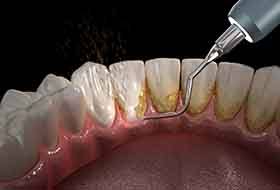Gum Disease Therapy – Wethersfield, CT
Safeguarding Oral & Overall Health
Gum disease is a bacterial infection that attacks the gums and roots of the teeth, and while it can wreak havoc on someone’s oral health, it’s also considered a risk factor for other serious diseases. Studies have shown a strong link between gum disease and diabetes, heart disease, and even Alzheimer's, so taking care of our patients’ gums is not only important for their smiles but their overall health as well! If your gums are red, feel tender, or bleed easily, you may already have gum disease, but we can take care of it right away if you give us a call.
Why Choose Wethersfield Dental Group for Gum Disease Therapy?
- Gum screenings at every checkup
- Designed to benefit both oral & overall health
- Deep cleanings eliminate infection at the source
Scaling and Root Planing

If we’re able to catch gum disease early enough, it can often be treated using a set of procedures called scaling and root planing, which is sometimes collectively called a “deep cleaning.” This entails clearing out all of the disease-causing bacteria and ensuring that the gum tissue is able to remain healthy. Here’s what you need to know about this treatment and how it’s able to effectively stop gum disease in its tracks!
Do I Need Scaling and Root Planing?

Gum disease is a menace, affecting roughly half of all adults over the age of 30 to some extent. However, gum disease is actually very treatable during its earliest stage, called gingivitis. At this point, the gum tissue usually appears reddish in color and swollen, and it might bleed slightly whenever you brush or floss due to the heavy presence of bacteria near the gumline. If this accumulation isn’t removed, the resulting infection can spread throughout the mouth and even the rest of the body. Believe it or not, gum disease can even lead to total tooth loss if it isn’t reversed. Fortunately, scaling and root planing treatment is one of the best ways of removing this bacterial buildup and promoting future oral health.
The Process of Scaling & Root Planing

The process of scaling and root planing is fairly simple and consists of two parts. First, an ultrasonic cleaner is used to thoroughly remove any plaque and tartar buildup along and beneath the gum line; this is known as scaling. After the pockets have been cleaned, the root planing portion of the treatment begins. A special dental instrument is used to smooth out the roots of your teeth, discouraging future buildup while also allowing the gum tissue to healthily reattach itself to your teeth. Depending on the severity of your tartar accumulation, it’s possible that this might require more than one appointment.
Aftercare Tips for Scaling and Root Planing

It’s considered normal to have some slight pain or tenderness for a few days after undergoing scaling and root planing, and your teeth will also likely feel a little sensitive. It’s also not unusual for your gums to be slightly swollen. But while your tissue heals, it’s wise to be proactive; do what you can to prevent infection and manage your discomfort accordingly. Here are some useful tips:
- Regularly rinse your mouth with lukewarm saltwater.
- Be extra gentle while brushing and flossing your teeth.
- Avoid spicy, acidic, and particularly hot or cold foods.
- Stick to a soft foods/liquids diet for at least 48 hours following your treatment.
- Follow any other instructions and guidelines provided by your dentist.
Antibiotic Therapy

After a patient has undergone a complete gum cleaning, Dr. Phadnis may choose to apply a topical antibiotic in order to eliminate any remaining bacteria. ARESTIN, which looks like a powder, is actually an antibiotic that’s made up of thousands of tiny microspheres, each one filled with a powerful antimicrobial agent. It will quickly dry on the gums and then slowly dissolve over the next week or so. This will allow the medicine to reach and kill leftover bacteria. Once the medication has run its course, we’ll recommend that a patient come to see us more often for regular dental cleanings so we can ensure the infection doesn’t have a chance to come back.

